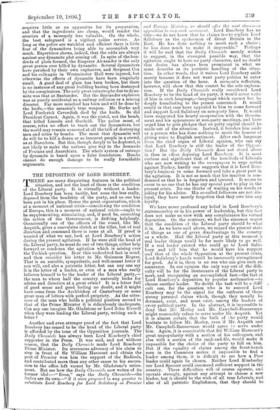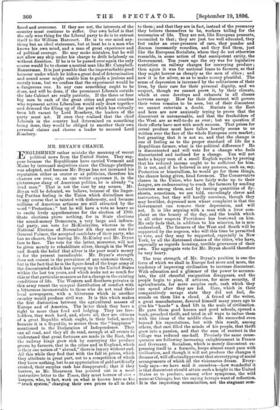THE DEPOSITION OF LORD ROSEBERY. T HERE are many disquieting features
in the political situation, and not the least of these is the condition of the Liberal party. It is virtually without a leader. Lord Rosebery has been tacitly, but none the less really, deposed from the headship of the party, and no one has been put in his place. Hence the great organisation, which at a moment of national crisis—considering the condition of Europe, this is a moment of national crisis—ought to be supplementing, stimulating, and, if need be, correcting the action of the Government, is drifting helplessly. Occasionally one of the officers of the vessel, like Mr. Asquith, gives a convulsive clutch at the tiller, but of real direction and command there is none at all. If proof is wanted of what we say, look at Lord Rosebery's action during the present agitation. If he were still the head of the Liberal party, he must do one of two things, either help forward or condemn the agitation which is arising over the Turkish question. Bear this undoubted fact in mind, and then consider his letter to Mr. Guinness Rogers. That is an amiable, sympathetic, and well-meant letter if you will, and also a patriotic letter, but can any one say it is the letter of a leader, or even of a man who really believes himself to be the leader of the Liberal party,— the man to whom half the country naturally looks for advice and direction at a great crisis ? It is a letter full of good sense and good feeling no doubt, and it might have come from the Archbishop of Canterbury or some great man of letters with perfect propriety. As the utter- ance of the man who holds a political position second to that of the Prime Minister it is ridiculously inadequate. Can any one imagine Mr. Gladstone or Lord John Russell when they were leading the Liberal party, writing such a letter ?
Another and even stronger proof of the fact that Lord Rosebery has ceased to be the head of the Liberal party is afforded by the tone of the Opposition journals. The Daily Chronicle has always been Lord Rosebery's chief supporter in the Press. It was said, and not without reason, that the Daily Chronicle made Lord Rosebery Prime Minister. Its strenuous advocacy of his claim to step in front of Sir William Harcourt and obtain the post of Premier won him the support of the Radicals, and contributed more than any other cause to his succes- sion to the office left vacant by Mr. Gladstone's retire- ment. But see how the Daily Chronicle now writes of its former idol :—" Even," says the Daily Chronicle—the italics are its own—" if it were proposed in any quarter to substitute Lord Rosebery for Lord Salisbury as Premier and Foreign Minister, we should offer the most strenuous opposition to any such movement. Lord Rosebery has no title—we do not know that he claims it—to replace Lord Salisbury as the spokesman of Great Britain in the East. He has done nothing to merit such a choice ; he has done much to make it impossible." Perhaps it will be said that the Daily Chronicle merely wishes to suggest, in the strongest possible way, that the agitation ought to have no party character, and no doubt that desire has always been prominent in what we must describe as its patriotic handling of the situa- tion. In other words, that it waives Lord Rosebery aside merely because it does not want party politics to enter into the question of the hour. A moment's reffeetion, however, will show that this cannot be the sole explana- tion. If the Daily Chronicle really considered Lord Rosebery to be the head of its party, it would never write of him in such language,—language which cannot but be deeply humiliating to the person concerned. It would surely in that case have appealed to him to come forward and support Lord Salisbury on non-party lines. It would have suggested his hearty co-operation with the Govern- ment and his appearance at non-party meetings, and have urged him to give pledges that no party capital should be made out of the situation. Instead, it brushes him aside as a person who has done nothing to merit the honour of giving voice to English sentiment. After such language from the chief organ of Liberal opinion, who can say that Lord Rosebery is still the leader of the Opposi- tion? But the Daily Chronicle does not stand alone in thus in effect deposing Lord Rosebery. It is most curious and significant that of the hundreds of Liberals who are now writing to the newspapers to urge action against Turkey, hardly one suggests that it is Lord Rose- bery's business to come forward and take a great part in the agitation. It is not so much that his inaction is con- demned as that he is forgotten and ignored. It seems to occur to no one that he has any special part to play in the present crisis. No one thinks of waiting on his words or asking for his advice. His so-called followers are not dis- loyal, they have merely forgotten that they owe him any loyalty.
We have never professed. any belief in Lord Rosebery's statesmanship or in his power of leadership, but this fact does not make us view with any complaisance his virtual deposition. On the contrary, we feel the sincerest regret that the condition of the Liberal party should be what it is. As we have said above, we regard the present state of things as one of grave disadvantage to the country as a whole. Had the Liberal party at this moment a real leader things would be far more likely to go well. If a real leader existed who could go to Lord Salis- bury and tell him that he would have his support and that of the whole Opposition at the present crisis, Lord Salisbury's hands would be immensely strengthened. for good. As it is, there is no one who can give such an assurance. In our opinion the only way out of the diffi- culty will be for the lieutenants of the Liberal party to meet, and recognising an accomplished fact—the fact of Lord Rosebery's deposition by popular acclamation—to choose another leader. No doubt the task will be a diffi: , cult one, for the question who is to succeed Lord Rosebery may be the signal for the outburst of those strong personal claims which, though they usually lie dormant, exist, and must exist, among the leaders of every political party. In the abstract, it is impossible to deny that Mr. Morley and Mr. Campbell-Bannerman might reasonably refuse to serve under Mr. Asquith. Yet it is almost certain that the bulk of he party would hesitate to follow Mr. Morley, even if Mr. Asquith and Mr. Campbell-Bannerman would agree to servo under him. Again, it is conceivable that Sir William Harcourt's great unpopularity with a section of his colleagues, and also with a section of the rank-and-file, would make it impossible for the choice of the party to fall on him. But if the equality of claims among the front-bench men in the Commons makes it impossible to find a leader among them, it is difficult to see how a Peer leader could again be chosen. Neither Lord Kimberley nor Lord Spencer could command sufficient support in the country. These difficulties will of course operate, and operate strongly, against any attempt to choose a new leader, but it should be the wish of all true Liberals, and also of all patriotic Englishmen, that they should be laced and overcome. If they are not, the interests of the 'country must continue to suffer. Our own belief is that the only wise thing for the Liberal party to do is to entrust itself to Sir William Harcourt. He is to our mind any- thing but an ideal statesman, but at least he is a man who knows his own mind, and a man of great experience and of political courage. He may make mistakes, but he will not allow any ship under his charge to drift helplessly on without direction. If he is to be passed over again the only .course would be to choose a neutral man like Mr. Campbell- Bannerman. It is just possible that the imperturbable good humour under which be hides a great deal of determination and sound sense might enable him to guide a jealous and .unruly team, but we confess that the experiment would be & dangerous one. In any case something ought to be done, and will be done, if the prominent Liberals outside the late Cabinet are really patriotic. If the three or four big men in each of the great cities and great counties who represent active Liberalism would only draw together and demand the filling up of the post which has virtually been left vacant by Lord Rosebery, the leaders of the party must act. If once they realised that the chief Liberals in the country had determined on something being done, they would be obliged to smother their own personal claims and choose a leader to succeed Lord Rosebery.



































 Previous page
Previous page